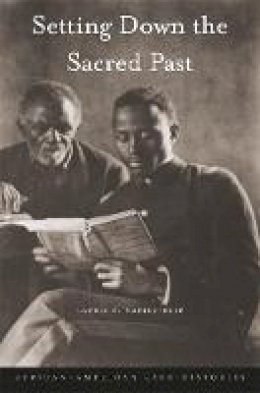
Stock image for illustration purposes only - book cover, edition or condition may vary.
Setting Down the Sacred Past: African-American Race Histories
Laurie F. Maffly-Kipp
€ 59.14
FREE Delivery in Ireland
Description for Setting Down the Sacred Past: African-American Race Histories
Hardback. As early as the 1780s, African Americans told stories that enabled them to survive and even thrive in the midst of unspeakable assault. Tracing the narratives from the late eighteenth century to the 1920s, this work presents an extraordinary trove of sweeping race histories that African Americans wove together out of racial and religious concerns. Num Pages: 352 pages. BIC Classification: 1KBB; DSB; HBJK; HRAX; HRC; JFHF; JFSL3. Category: (G) General (US: Trade). Dimension: 235 x 155 x 30. Weight in Grams: 635.
As early as the 1780s, African Americans told stories that enabled them to survive and even thrive in the midst of unspeakable assault. Tracing previously unexplored narratives from the late eighteenth century to the 1920s, Laurie Maffly-Kipp brings to light an extraordinary trove of sweeping race histories that African Americans wove together out of racial and religious concerns. Asserting a role in God's plan, black Protestants sought to root their people in both sacred and secular time. A remarkable array of chroniclers-men and women, clergy, journalists, shoemakers, teachers, southerners and northerners-shared a belief that narrating a usable past offered hope, pride, and the promise of a better future. Combining Christian faith, American patriotism, and racial lineage to create a coherent sense of community, they linked past to present, Africa to America, and the Bible to classical literature. From collected shards of memory and emerging intellectual tools, African Americans fashioned stories that helped to restore meaning and purpose to their lives in the face of relentless oppression. In a pioneering work of research and discovery, Maffly-Kipp shows how blacks overcame the accusation that they had no history worth remembering. African American communal histories imagined a rich collective past in order to establish the claim to a rightful and respected place in the American present. Through the transformative power of storytelling, these men and women led their people-and indeed, all Americans-into a more profound understanding of their interconnectedness and their prospects for a common future.
Product Details
Publisher
Harvard University Press United States
Number of pages
352
Format
Hardback
Publication date
2010
Condition
New
Weight
635g
Number of Pages
352
Place of Publication
Cambridge, Mass., United States
ISBN
9780674050792
SKU
V9780674050792
Shipping Time
Usually ships in 7 to 11 working days
Ref
99-1
About Laurie F. Maffly-Kipp
Laurie F. Maffly-Kipp is Associate Professor of Religious Studies at the University of North Carolina at Chapel Hill.
Reviews for Setting Down the Sacred Past: African-American Race Histories
Maffly-Kipp draws on lectures, sermons, plays, poetry, and other works of several little-known writers from the American Revolution and WWI that reflect on how the black community in the U.S. has attempted to record and analyze the meaning of the African diasporic experience. She explores the works of free blacks during slavery as they attempted to write their own histories and examine their circumstances as distinct and similar to that of slaves. Among those she examines: Lorenzo Dow Blackson, a self-educated African American Methodist preacher; Jacob Oson, a teacher at an African American school in New Haven, Connecticut, in the 1800s; and George Washington Williams, who in the late 1800s attempted to write the history of the African race. These writers add valuable perspective to the works of better-known black authors and a full perspective on African American history.
Vanessa Bush Booklist 20100401 Maffly-Kipp resists simpler analyses that would cast these race histories in unapologetic heroic mode or cram them all into the model of liberatory texts or (going the opposite direction) decry their tendency to follow European and Protestant models of historical narrative. Instead, she gives a rich and satisfying account of texts in which race was only a partial unifier...[An] impressive feat of intellectual history and literary recovery.
Paul Harvey Books & Culture 20100701
Vanessa Bush Booklist 20100401 Maffly-Kipp resists simpler analyses that would cast these race histories in unapologetic heroic mode or cram them all into the model of liberatory texts or (going the opposite direction) decry their tendency to follow European and Protestant models of historical narrative. Instead, she gives a rich and satisfying account of texts in which race was only a partial unifier...[An] impressive feat of intellectual history and literary recovery.
Paul Harvey Books & Culture 20100701
